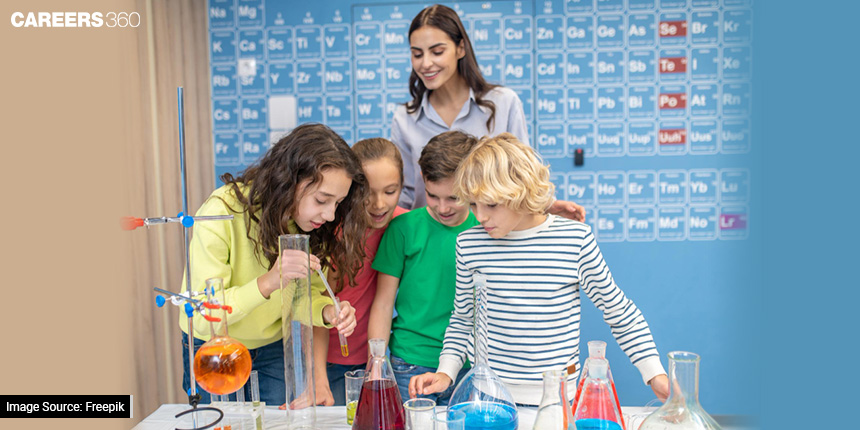Why Science Is Best Learnt In a Laboratory?
Conducting experiments in the laboratory is a vital part of the school years. With the changing times and syllabus, the education system in India is encouraging school managements to have fully functional laboratories at their schools. However, due infrastructural, technological and moreover financial constraints even basic laboratories are not available in all schools across the country.

At the laboratories, children learn from teachers who provide practical guidance to explore scientific problems and propose solutions. Lab and field experiences help students understand science practices and STEM (science, technology, engineering and mathematics) careers together. In this article, we lay out the importance of how laboratories influence and impact learning among young students.
Also Check- Engineering: Minor Degree Courses That Can Boost Your Career
Biology
A biology lab is where students learn in detail about the anatomy of living organisms - animals, plants, human beings and so on. They investigate various aspects, from discovering stomata in plants to observing plasma membranes and cell walls in onion peels. By experimenting with the impact of different fertilisers on plant growth students learn about plant nutrition and sustainable agricultural practices.
Working in a lab helps those students who have an interest in experimental biology to pursue a career in pathology, microbiology, epidemiology, forensic sciences etc. Centre for Cellular and Molecular Biology (CCMB) Hyderabad, and Institute of Genomics and Integrative Biology (IGIB) New Delhi are a few of the famous biological research institutes in India.
Chemistry
In a chemistry lab students can perform experiments that involve chemical substances, studying their reactions, synthesising compounds, determining properties of substances, and analysing their structures. From checking the pH level of the food materials to separating mixtures through sedimentation, decantation and filtration are performed in chemistry labs; this all and more is where children can live their Dexter’s Laboratory dream, albeit with caution and supervision.
Chemistry labs encourage curiosity among students about the chemical properties and physical properties of substances around them. The students can observe how elements react with each other in the lab. For instance, by rusting an iron nail the student learns how iron reacts with the oxygen and brings about a change in the chemical properties of iron.
Students who have an interest in chemistry can pursue a career in chemical engineering, pharmacology, biochemistry, food technology and more. The National Chemical Laboratory (NCL), and the Council of Scientific and Industrial Research are some of the famous laboratories for chemical research in India.
Physics
Physics like Maths is often a feared subject, but if approached with clarity and precision it can be a very encouraging and satisfying subject. In the Physics lab students conduct experiments that range from Archimedes's experiment to finding the focal length of a lens. A Physics lab gives the student the perspective of the application of the theoretical aspects of scientific observations. Drawing inferences from collected data gives an approach of critical thinking to students. For instance, by measuring the acceleration due to gravity with a pendulum the students grasp the concept of gravity and motion.
Students who have an interest in Physics can pursue a career as astrophysicists, radiologists, astronomers and more. Indian Institute of Astrophysics (IIA), the Inter-University Centre of Astronomy and Astrophysics (IUCAA), and the National Centre of Radio Astronomy (NCRA) are some of the famous laboratories for physics and its branches.
Also Read-Ancient Indian Sporting Heritage: 6 Games That Found Their Way Into Our Modern Lives
Mathematics
This is not a common feature at schools or even colleges, but often at institutes of higher learning you would come across a Maths lab where students learn the concept through mathematical experiments. Here students learn a real-life approach to the mathematical concepts. Students learn abstract concepts like algebra or geometry, by conducting experiments like verifying an algebraic expression or congruence of triangles. Students with an interest in Maths can pursue a career in the field of applied mathematics like risk analyst, cryptography, actuarial science etc.
Computer Labs
As India makes digital advances, it is important that our future generations are in tune with global standards of learning digital skills. In a computer lab, students get hands-on experience with software applications, programming and other multimedia applications. Here students are introduced to present technology and computer applications. With the evolving technological sector, the current generation needs to be prepared with skills in coding to stay relevant in the job market. Coding is not only necessary for and it also develops cognitive brain abilities in students. From designing a simple website using HTML and CSS to developing basic coding skills and the fundamentals of web development can be learnt here. Students with practical insights into computers can pursue careers in computer science, robotics, Internet of Things artificial intelligence and more.
Virtual Reality Labs
Virtual labs are online platforms that simulate real laboratory experiments and activities for educational and training purposes. VR labs are essential in developing countries for education and skill training. These online platforms overcome physical barriers, impacting students and teachers. Integrating ICT( Information and Communications Technology) with conventional labs enhances learning experiences and provides a "real-world"-like experience in science and research-related fields. Though these labs lack hands-on practice, they complement traditional labs, benefiting subject learning and promoting effective education
Applications for Admissions are open.
As per latest syllabus. Physics formulas, equations, & laws of class 11 & 12th chapters
JEE Main Important Chemistry formulas
Get nowAs per latest syllabus. Chemistry formulas, equations, & laws of class 11 & 12th chapters
JEE Main high scoring chapters and topics
Get nowAs per latest 2024 syllabus. Study 40% syllabus and score upto 100% marks in JEE
JEE Main Important Mathematics Formulas
Get nowAs per latest syllabus. Maths formulas, equations, & theorems of class 11 & 12th chapters
